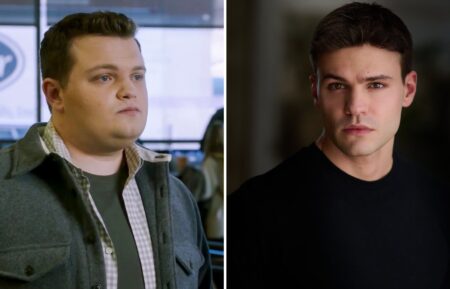‘Doctor Who’ Stirs Up a Whole Cauldron of Fun in ‘The Witchfinders’ (RECAP)
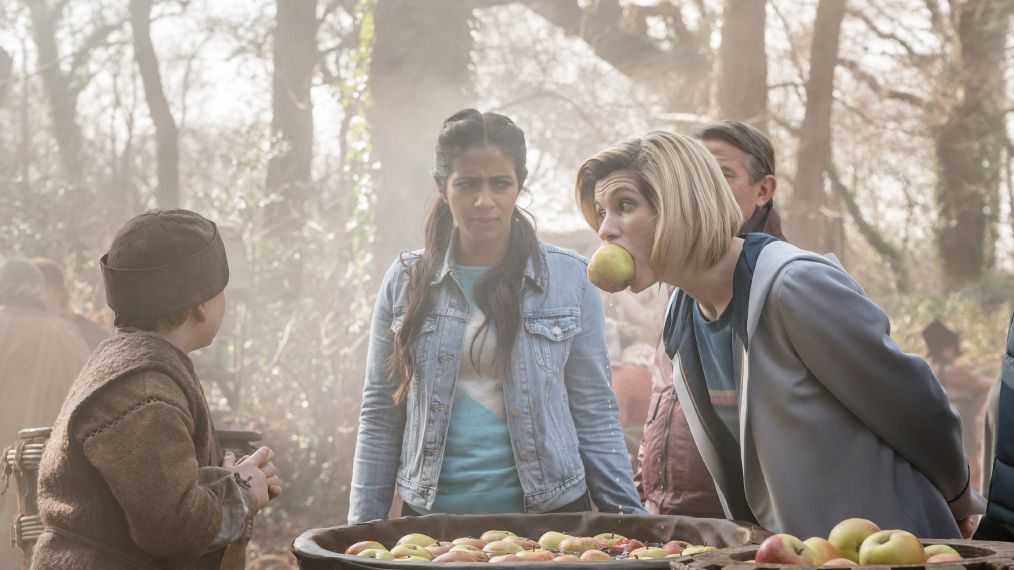
Spoiler Alert
There was a huge reaction across the Doctor Who fanbase when it was first announced that a woman would play the thirteenth Doctor. Many were excited about the change, and others declared it the death of the show, while no doubt crying into their Tom Baker posters and writing angry posts at Gallifrey Base. And yet, for the most part, Season 11 has cleverly sidestepped the issue of gender (other than a couple of quick quips here and there). Instead, Jodie Whittaker is just The Doctor, no labels, no caveats. And she’s bloody great!
“The Witchfinders,” written by Joy Wilkinson (who penned the BBC Dickens adaptation Nick Nickleby), is the first episode that tackles The Doctor’s gender in any sort of direct way. Set against the backdrop of the Pendle Hill witch trials in 17th-century Lancashire, The Doctor finds herself sidelined, mocked and persecuted for daring to be a woman with a voice. Wilkinson’s script is tight and purposeful and allows for Whittaker to deliver her best performance yet.
The era of the witch trials is the perfect environment to highlight the differences between this Doctor and the ones who came before. While there’s no doubt each variation of the Time Lord would feel compassion for the women on trial, no previous Doctor would find themselves accused of being a witch or being told to butt out because all they’re good for is “nosiness and gossip.” That is something which arises distinctly due to The Doctor’s gender, and it’s one of the reasons which makes “The Witchfinders” one of the stronger episodes of the season.
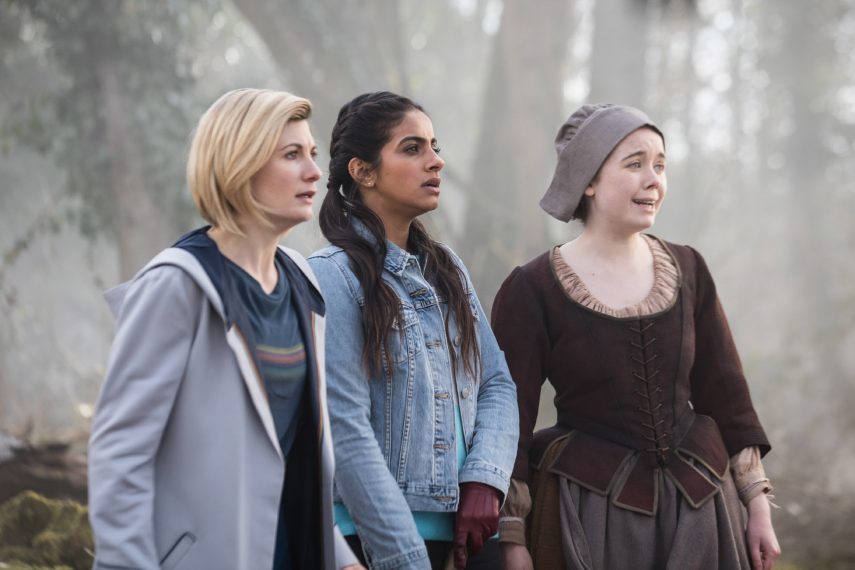
Photo: BBC America
Also, this episode is just plain fun, a quality that has been sorely missing from this season. Wilkinson’s script moves at a swift pace, not wasting any time with tedious set-up. We’re dumped right into the story with Team TARDIS already lost in the 17th-century town of Bilehurst Cragg. After a quick game of apple-bobbing, the crew soon find themselves confronted by a witch-dunking, presided over by the imposing Becka Savage (a brilliantly stern Siobhan Finneran), a local landowner and self-declared fighter of Satan.
The action rarely lets up from that point forward. Team TARDIS split up in an effort to put a stop to the witch hunt and find out what’s going on with the town’s seemingly sentient mud. Yaz (Mandip Gill), for once used more than a mere plot device, bonds with Willa (Tilly Steele), the young girl whose grandma was drowned to death by Miss Savage. Not only is Yaz the first person to discover the alien presence, but she gets to give her own Doctor-like speech about overcoming fear, revealing that she was bullied in high school.
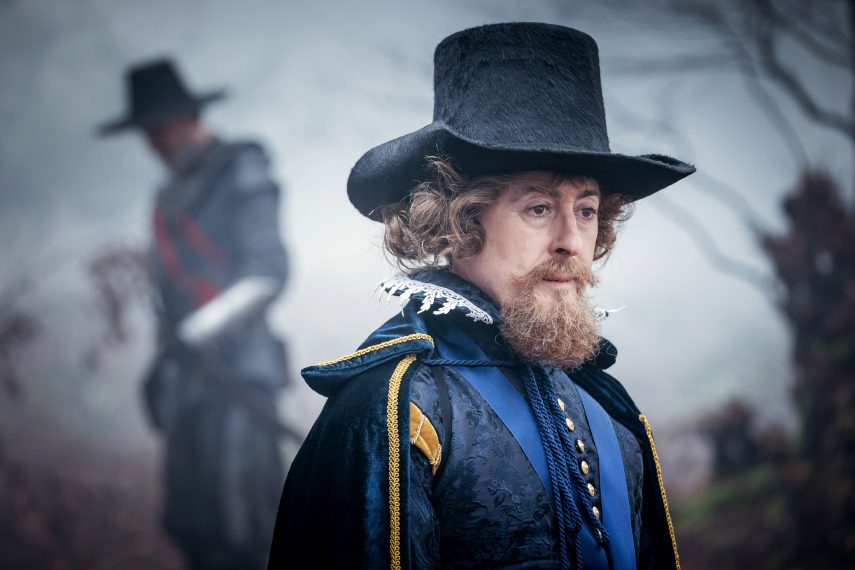
Photo: BBC America
Cumming absolutely steals the show with his hilariously hammy turn as King James. The intentional campiness of his performance does somewhat make for a tonally odd episode at times, but he’s such a delight to watch that you can forgive the sudden mood changes. It’s just such a refreshing adjustment from the many straight-laced, data-spewing guest stars of previous episodes. Let’s put it this way, I’d take Cumming’s King James over any of the guest characters in “The Tsuranga Conundrum.”
Despite the comical nature of the performance, Wilkinson doesn’t make James a one-note punchline. She leans into the rumors of his bisexuality and the theory that his mother, Mary Queen of Scots, had his father, Henry Stuart, murdered in cold blood (of course Ryan gives us his weekly reminder that his mom and nan are dead). James becomes a three-dimensional character with strengths and weaknesses. In one of the standout scenes, The Doctor accuses the King of hiding behind his title; that he kills because he is afraid of things he doesn’t understand.
That’s what this episode is all about. The fear of the unknown. And specifically, how people react to that which they don’t understand, whether it be a woman making healing medicines or an army of axe-wielding mud-zombies. King James chooses to “stir up hate” and turn people into “scapegoats.” The Doctor, however, tries to learn, she wants to offer help, but it’s that which gets her branded an “acolyte of Satan” and strapped to the Ducking Stool. “If only I was still a bloke, I could just get on with the job without having to constantly defend myself,” the Doctor says.
“Do you know why the Ducking Stool was invented, Doctor? To silence foolish women who talk too much,” Miss Savage explains, before dunking the Doctor underwater. A few chains are not enough to keep a good Doctor down though, especially ones that spent a wet weekend with Houdini (namedrop), and our favorite Time Lord emerges from the water more determined than ever. It’s a gripping sequence, and much like Pete McTighe’s episode last week, Wilkinson knows how to ramp up the suspense, particularly towards the finish.
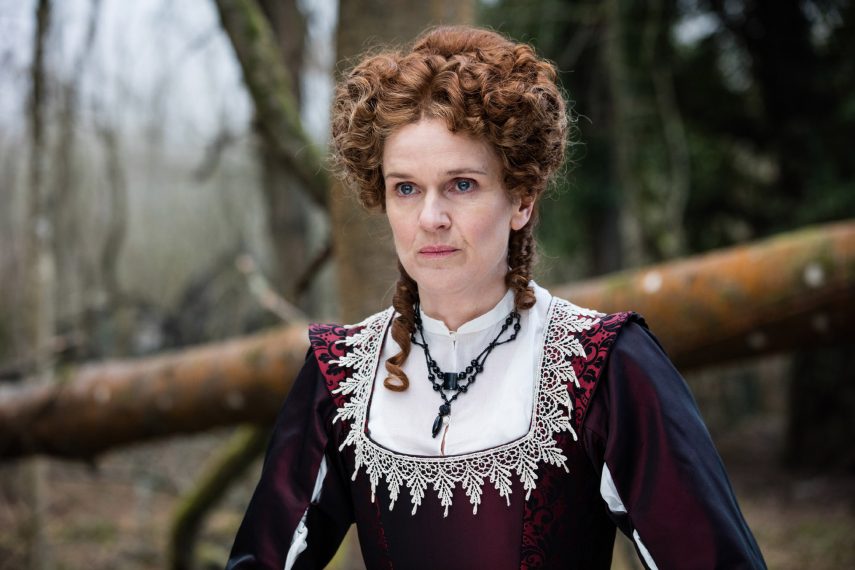
Photo: BBC America
However, unlike “Kerblam!”, Wilkinson doesn’t botch the ending with mixed messaging. The resolution may not be the most groundbreaking of twists in Doctor Who history, but it works for what it is. It turns out Pendle Hill is a prison for an alien army, the Morax, who were charged with committing war crimes. The Morax were set free when Miss Savage unintentionally chopped down the tree keeping them trapped. Finneran’s face morphing into the Queen Morax, with her tree-bark skin, is genuinely quite creepy and should provide a nice scare for the younger viewers.
This season is three-for-three when it comes to historical episodes, which have sort of become season 11’s calling card at this point. The tone wasn’t as serious as “Rosa” or “Demons of the Punjab,” but it still had a point to make, and it made it well, while still allowing for some campy fun in the process. In a season of higher quality, this would probably only amount to an above-average installment of Who, but in this mixed bag of a series, “The Witchfinders” was an enchanting episode.
Additional Notes:
-The Pendle Hill witch trials were a real historical event. They took place in 1612 and led to the deaths of ten people by hanging. The character of Becka Savage, however, does not appear to be based on any specific historical figure. Nor were the mud-zombies, just to make that clear.
-“Witchfinders” were also real. The most infamous, Matthew Hopkins, is said to have been responsible for the deaths of 300 women between the years 1644 and 1646. He called himself the “Witchfinder General,” the title given to Graham in this episode. Vincent Price played Hopkins in a 1968 film based on Ronald Bassett’s heavily-fictionalized novel. In the movie, Price wore a black pointy hat like the one Graham was given.
-What was the book The Doctor found in Miss Savage’s bedroom? That was Daemonologie, written and published by King James I himself, which again, is very, very real. The book was all about black magic, including vampires, werewolves, and, of course, witches, particularly how one should go about catching them.
-This episode looked fantastic. The foggy landscapes and swampy roads helped evoke that folk-horror vibe.
-If you want more witchy goodness, why not check out my recaps of Chilling Adventures of Sabrina!
Doctor Who, Sundays, 8/7c, BBC America







